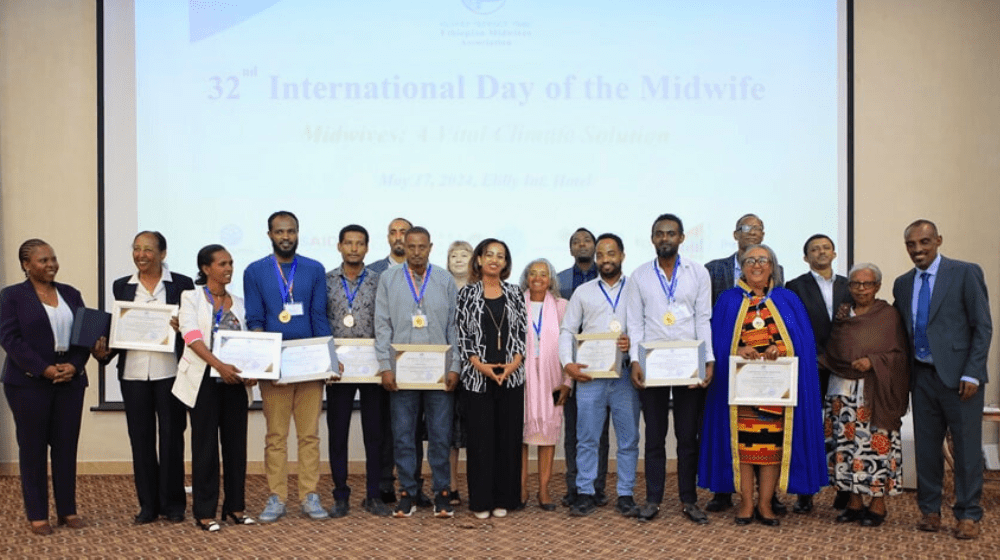Addis Ababa, Ethiopia - The International Day of the Midwife 2024 was celebrated by honoring midwives as unsung heroes in healthcare and vital contributors to climate solutions. The event, themed "Midwives: A Vital Climate Solution," highlighted the crucial roles midwives play in promoting sustainability and resilience.
Organized by the Ethiopian Midwives Association with support from UNFPA and various partners, the event attracted midwives from across Ethiopia. It was also attended by prominent delegates and stakeholders, including Dr. Mekedes Daba, Minister of Health, and the Honorable Werkesemu Mamo, Chairperson of the Health, Social Development, Culture, and Sport Affairs Standing Committee of the House of People's Representatives.
The event featured keynote remarks from representatives of key organizations such as FMOH, ACSO, the Swedish Embassy, USAID, UNFPA, UNICEF, Jhpiego, JSI, EngenderHealth, PSI, MSI, and ACSIS.
The Honorable Werkesemu Mamo emphasized that midwives play a critical role in safeguarding maternal and newborn health while contributing to a sustainable future in the face of climate change.
Dr. Mekedes Daba commended midwives for their tireless efforts in reducing maternal mortality, stating, "Midwives are the cornerstone of the healthcare system," and pledged to prioritize investments in their education, training, and working environment.
"Midwifery promotes sustainable practices," said Dr. Solomon Hailemeskel, President of the Ethiopian Midwives Association. He outlined key actions to optimize the effectiveness of midwives, including strengthening training, empowering leadership, and advocating for favorable policies.
UNFPA has been actively collaborating with the Ethiopian Midwives Association, resulting in the deployment of over 200 midwives to address sexual and reproductive health (SRH) and gender-based violence (GBV) needs in crisis-affected regions.
UNFPA Ethiopia Representative Koffi Kouame praised midwives, stating, "The midwife is always the hero of the story. They are the backbone of maternal and infant healthcare. They ensure safe deliveries, provide prenatal and postnatal care, and empower mothers with knowledge and support. However, their impact goes beyond healthcare; they are also a crucial climate solution." The representative concluded his remarks with a call to recognize midwives not only as healthcare providers but as champions of sustainability, resilience, and climate action. "Together, let us celebrate midwives as vital climate solutions and ensure their role is central in our efforts towards a healthier planet," he concluded, wishing all attendees fruitful deliberations.
The event highlighted that midwives reduce the need for interventions that consume significant resources and generate waste, thereby supporting eco-friendly practices and aligning healthcare with environmental sustainability. Furthermore, midwives are often at the forefront of community resilience efforts, particularly in times of climate-related disasters. Whether during drought, floods, or other emergencies, midwives provide essential care, ensure safe deliveries, and support community rebuilding efforts, showcasing their adaptability and resourcefulness.
At the cerimony, the association awarded six midwives from across Ethiopia who have served in conflict and climate crisis zones, saving mothers and babies even in dangerous conditions with limited access to basic medicine and infrastructure. These awards underscored the extraordinary commitment and bravery of midwives working under challenging circumstances.


